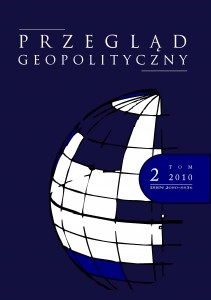Rosyjski panslawizm jako idea geopolityczna
The Russian pan-slavism as a geopolitical idea
Author(s): Piotr EberhardtSubject(s): Politics / Political Sciences, History, Political Theory, Political history, Recent History (1900 till today), Geopolitics
Published by: Polskie Towarzystwo Geopolityczne
Keywords: Russia;pan-slavism;Iwan Kiriejewski;Slavic Federaion;Iwan Aksakow
Summary/Abstract: Is the article was presented a genesis, and then the development of Russian Pan-Slavism. This ideology had own geopolitical repercussion. Its basic aim was the creation federation of Slavic nations under Russian supremacy. Causes if its rising had political character and resulted form loss by Russian Crimean War, Polish Insurrection from 1863, and first of all the Turkish- Russian War (1875/1878). The need of coming with help oppressed by south Slavs'Turks stood an popular idea, which approached to it the Czarist Power, Orthodox church and then the political elites of Russia. The banner of Slavs' liberation became comfortable reason of construction an idea to necessity building a Great Imperium and territorial throphies. Beyond of capture Balkans, the basic goal was conquesting Constantinople and contaimenting the Bosphorus and Dardanelless. The idea of Pan-Slavism shaped in result of evolution opinions delivered by Russian Slavophile. It was then Russian intellectuals who referenced to the Old Russian traditions and had hostile to cultural influences of West-European area. It was presented activity and outlook the main Russian Slavophiles: Iwan Kieriejeski, Alieksiej Chomiakow, Iwan Aksakow and Jurij Samarin and where was described their philosophical and political opinions. In the article was presented their relation to the Poland matter of independence. They had negative opinions because according to their, Poland was a state belong to Latin civilization, which will not subordinate despotic Russia. Slavophilism changed, in result of nationalist growth and xenophobic tendencies. Organizing II Slavic Downhill Congress in Moscow was inpsiring this Transformation event (1867), which took apart all Slavic nations, except the Poles. The Pan-Slavistic ideas were universally accepted in Russian society. In the final effect, approved as the political and geopolitical doctrine. In the example of achievements creatores, Pan-Slavism was a reported idea principles and geopolitical intentions, this conception. In presenting work M. Danilewski, was reported praparation by him, territoral abattis future Slavic Federation. The Russian loss on the I World War and the Bolshevik revolt made up the end of Pan-Slavistic tenet. In later time linking to idea of Slavs unification had the episodic character and had not the large political meaning. It afterworld o article was including the opinion about Pan-Slavism form geopolitical side. Turn the attention, that this doctrine was imperial conception ad it aim, was not be include with creation of free Slavic states conception, but the Russian centralized empire. This idea was the one of great utopias, which came into being in XIX and inder end of XX this conception lost won timeliness.
Journal: Przegląd Geopolityczny
- Issue Year: 2010
- Issue No: 02
- Page Range: 43-64
- Page Count: 22
- Language: Polish

